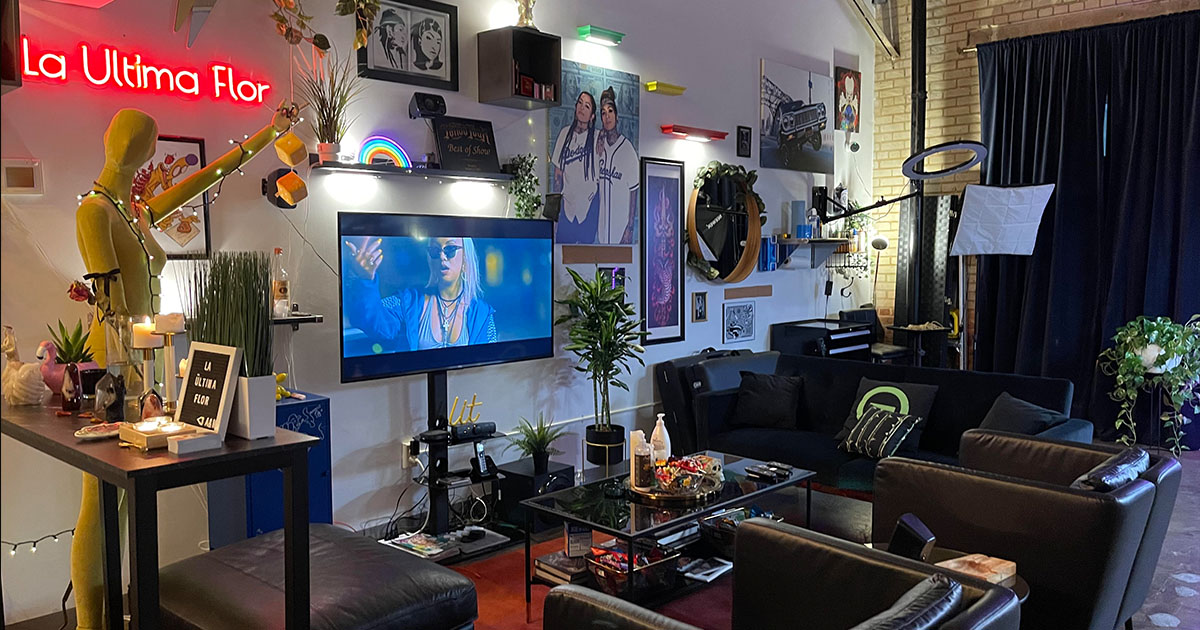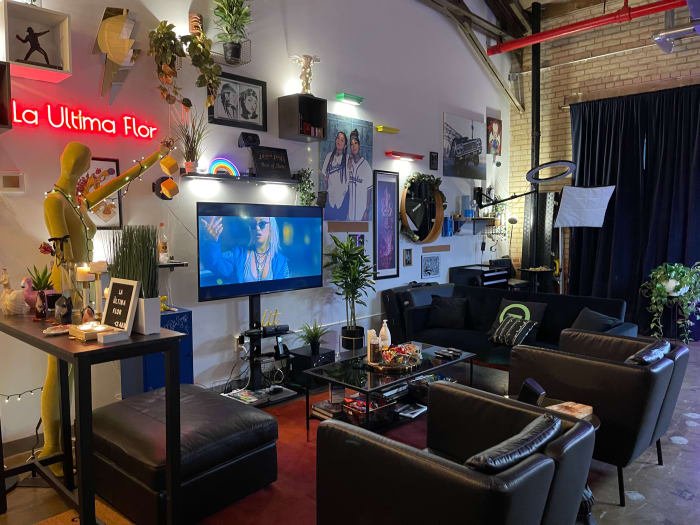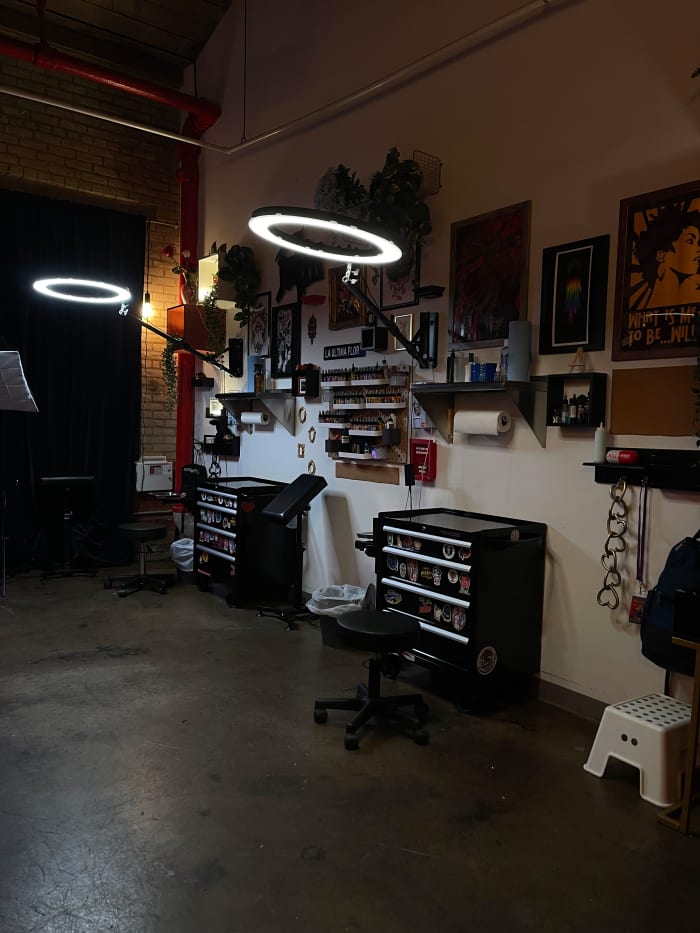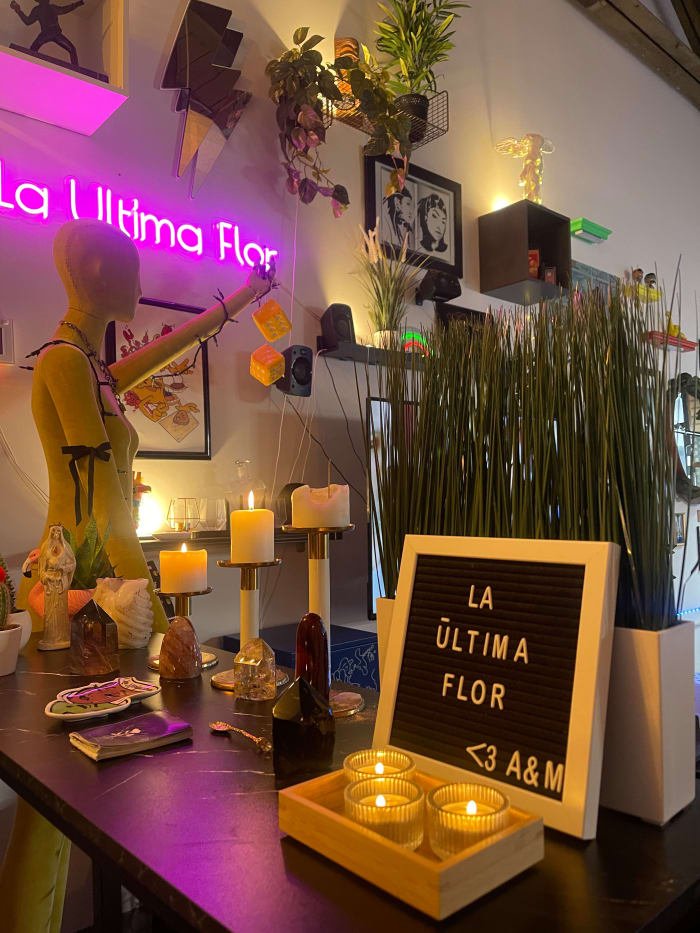Even the most tattooed person on the planet still has a certain trepidation when stepping into a new store. As a woman, someone who identifies as BIPOC, or a member of the LGBTQ+ community, it’s even more intimidating. Tattoo shops have long had a tough and intimidating exterior coupled with historical tradition dominated by men. Female and queer owned tattoo shops are trying to reshape our perception of what a tattoo shop can be. A brand new studio, La Ultima Flor is one of the few that creates a warm and welcoming atmosphere that encourages you to express yourself, no matter who you are.
Brooklyn-born Alexandra Abril and LA-born Monikka Velvet are two perfect examples of those in the industry who are amplifying inclusive tattoo shops. Abril, who is Latina, and Velvet, who is Filipina, are a married couple from similar backgrounds who both grew up loving art and getting tattooed. After working for nearly two years at a queer-owned Bushwick tattoo shop, High Hopes Tattoo, the two gracefully exited a new shop that represents their wildest visions.
“We decided that we could actually open a studio ourselves that would be convenient for us to tattoo,” says Velvet, “and any of our clients can come and feel safe too.” That year, the couple decided to take a leap of faith and to open his private studio La Ultima Flor. In this business, the artists have cultivated a vibrant utopia of art and creativity where guiding their clients through the sometimes daunting experience of tattooing is their top priority.
The whole process was quick, which was made easier by the fact that the artists were under a certain amount of pressure. “To be honest, I looked everywhere for a place,” says Abril. After stumbling across an entry on Craigslist, she went into overdrive. “I poured my heart out in the email and said we needed a place to tattoo. My wife and I want to create something bigger. We have been in the industry for so many years and [the lister] felt that. It was just all a miracle that we are so thankful for. And now we have this, so it’s been a nice trip.”
La Ultima Flor eschews the stereotypical image of a tattoo shop and signals to newcomers that this is a safe place. Walls covered in art and plants, neon signs, a mannequin draped in Christmas lights, a mirror backlit by LED strips, and lit candles set the mood. A refrigerator stocked with refreshments, sweets and snacks on hand, a coffee maker and 90 Day Fiance on the big screen make you feel right at home. Basically, think about your artistic friend’s bedroom on a Friday night bumped into 8pm.
Coming from two opposite coasts, the clash of the worlds of Velvet and Abril gives the store its flair. “As soon as you walk into our store, you definitely get a sense of gangster West Coast vibes mixed with Brooklyn’s grittiness and rawness,” says Velvet. Many of the artworks on their walls are also by artists who grew up in Brooklyn. “And when we’re not watching TV,” says Abril, “it’s the music we’re playing. People already know, okay, you’re definitely either from New York or LA. We’re proud of where we’re from, you know? Brooklyn is authenticity, toughness and [Velvet] is chill and 420 vibes all the time. Mixing it together is great.”
As artists who have been tattooing for years and are avid tattoo collectors themselves, Velvet and Abril know the feeling of standing in a tattoo shop and contemplating getting a piece. “As soon as you walk into a store, you feel like you’re holding your nose up,” Velvet muses. “Or they’ll say, ‘You’re gay, don’t come into my store.’ You feel that coming automatically.” The discomfort they have felt from ostracism is something they wish no one else ever had to experience.
Queer-Owned, People of Color-Owned Tattoo Shops are are becoming increasingly important nationwide, which is vividly changing the landscape of what tattoo culture has been like for years. La Ultima Flor is one of the few to proudly carry the torch into this new generation. With shops like hers, people no longer automatically think of a hyper-masculine ambience when they think of a tattoo shop. By simply pursuing what they are passionate about, artists are reclaiming a place in the industry that has tried unsuccessfully to shut them out.
“It was definitely a lot harder [entering the tattoo industry] being a woman,” says Velvet. “And we’re both black women, we’re lesbian, and we’re married. So people see it like, ‘What the hell is that? That’s so many X’s there.’ But that’s exactly what we love. We just keep going. We will prove everyone wrong.”
Anyone who has ever had a tattoo knows that the process is more than just a business – it’s an experience. When you look back at this piece, you want to remember a positive memory associated with it because it’s on your body forever. It’s easy to see why people who have struggled to be accepted for their identity seek tattoo artists to share their lived experiences. With the introduction of more familiar and comforting faces to tattoo shops, more people who had reservations about tattoos will finally feel confident about taking the first step into a new business.
“It’s part of the overall experience,” affirms Velvet. “It’s not just, hey, you get a tattoo, you’re in and out. nope You want to come and chill, then smoke a blunt, we’re downstairs.”



